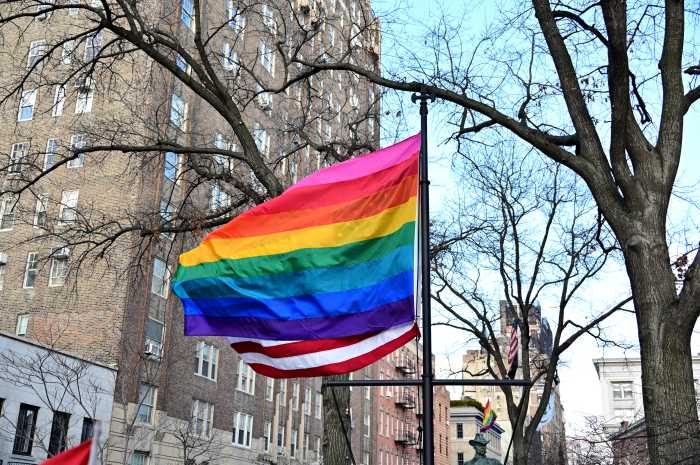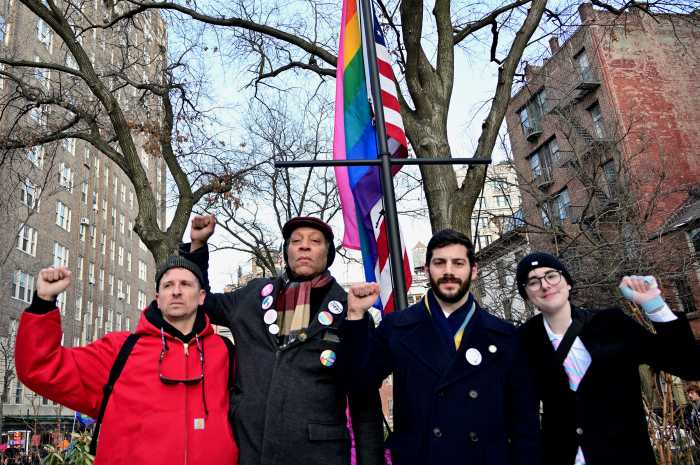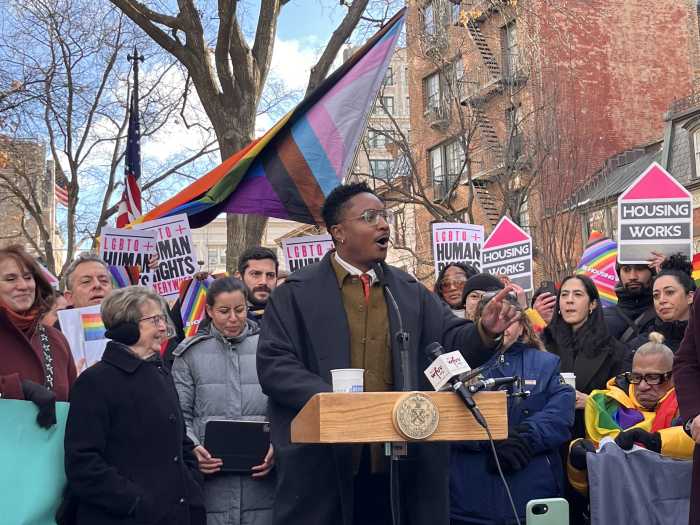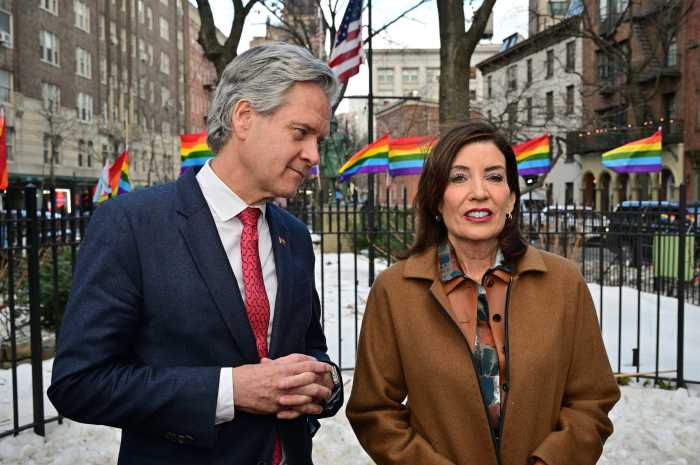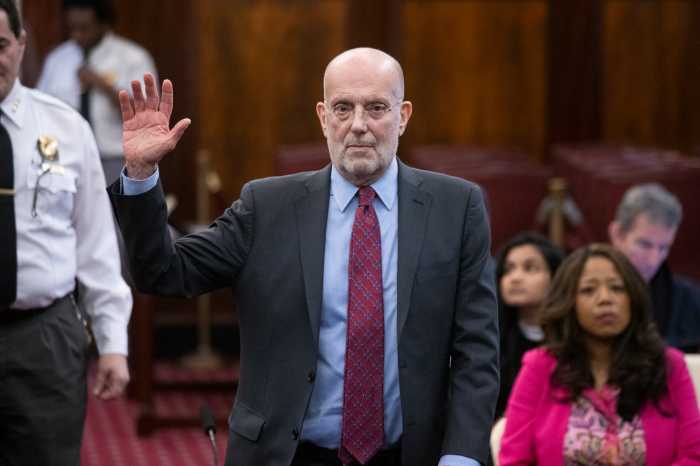In a political shift of titanic proportions, Spain legalized same-sex marriage on June 30, despite the vehement opposition of the Vatican and bishops of this overwhelmingly Roman Catholic nation and parlimentary opposition.
The Socialist-led Congress of Deputies, Parliament’s lower house, overrode the Senate and defied the once-dominant Roman Catholic Church by voting 187-147, with four abstentions, to begin issuing marriage licenses to same-sex couples.
Four days later on July 4, gay and lesbian couples across Spain lined up to get married, swelling the lines inside Madrid’s Civil Registry building.
Prime Minister José Luis Rodriguez Zapatero said during the parliamentary debate that the legislation was “a small change in wording that means an immense change in the lives of thousands of citizens. We are not legislating, ladies and gentlemen, for remote unknown people. We are expanding opportunities for the happiness of our neighbors, our work colleagues, our friends, our relatives.”
Zapatero added, “We were not the first, but I am sure we will not be the last. After us will come many other countries, driven, ladies and gentlemen, by two unstoppable forces: freedom and equality.”
On July 6, the new marriage law hit a snag when the Catalonia Supreme Court of Justice, citing an article in the Spanish civil code, ruled that an Indian gay national may not marry his male Spanish partner because India prohibits same-sex marriage.
The regional court said that gay men may appeal the ruling to the Justice Ministry, which, as of Wednesday afternoon, had not issued a decision.
Nevertheless, on Sunday, more than 100,000 participants in Madrid’s gay pride parade celebrated the law’s passage and hailed leading members of Zapatero’s Socialist Workers Party who addressed the throngs. Opinion polls after the law’s enactment indicate that Spaniards support same-sex marriage by a margin of 62 to 30 percent. As the debate over the issue intensified over the last several months, the popularity of the ruling Socialists has risen.
In an audience with Pope Benedict XVI on July 5, Madrid’s Cardinal Antonio Rouco Varela denounced the new law. Spanish society, Rouco said, is being tempted by proposals for radical secular lifestyles that “not only deny the faith, but also our very humanity, as can be seen in the recent legislation on marriage.”
The pontiff, as did his predecessor John Paul II, strongly opposes same-sex marriage and has called on Catholic marriage officials in Spain to quit their jobs on religious reasons rather than marry gay and lesbian couples.
One elected official, while not citing religious opposition, voiced his unwillingness to marry gays and lesbians
“Even though the law allows me to marry homosexuals, I will never exercise this authority,” said Valladolid Mayor Javier Leon de la Riva, in a television interview. “I have no problems regarding the fact that these couples have the same rights as other citizens, but I do not think it right for their union to be called marriage.”
With the signatures of Zapatero and King Juan Carlos, Spain becomes the third European country to legalize same-sex marriage after the Netherlands and Belgium. A similar bill passed the Canadian Parliament last week and requires a vote in the Senate, considered a formality, before its enactment.
The Spanish language goes beyond the Dutch and Belgian laws by also allowing gay couples to adopt children, still a sticking point in much of Europe. Holland now allows for gay adoptions and Belgium is reconsidering its prohibition. Neither Holland nor Belgium sanction marriages for same-sex couples from abroad.
Most of Western Europe provides some form of partner recognition for gay and lesbian couples. In the United States, federal law forbids the recognition of same-sex marriages performed abroad, but Massachusetts has allowed couples to marry since last year and Connecticut has joined Vermont in granting civil unions, with California having enacted a very broad domestic partnership law last year.
In his speech celebrating the marriage law’s passage, Zapatero said, “Today, the Spanish society answers to a group of people who for many years have been humiliated, whose rights have been ignored, whose dignity has been offended, their identities denied and their liberty oppressed. Today the Spanish society grants them the respect they deserve, recognizes their rights, restores their dignity, affirms their identity and restores their liberty.
“It is true they are only a minority,” the prime minister continued, “but their triumph is everyone’s triumph. It is also a triumph of those who oppose this law, even though they do not know it yet, because it is the triumph of liberty.”
Zapatero said that the new law “enhances and respects marriage.”
In recent weeks, opponents of the law, including the opposition Popular Front Party and Catholic-led organizations, held two huge public rallies, gathering the signatures of 600,000 Spaniards who do not support same-sex marriage, in a last-minute effort to defeat the bill.
Earlier in the week, Parliament had voted to end the mandatory separation period for couples seeking to divorce and eliminated the requirement that a spouse filing for divorce had to specify the reason.
Conscious of the intense controversy his bill had generated, Zapatero told Parliament that “like other reforms to the marriage code that preceded this one, this law will generate no evil, that its only consequence will be avoiding of senseless suffering of decent human beings. A society that avoids senseless suffering of decent human beings is a better society.”
Up until 1975, the right-wing dictator Generalissimo Francisco Franco governed Spain. Since his death, Spanish culture has become more open, with the international acclaim for openly gay filmmaker Pedro Almodovar as but one example.
“Now we are legal!” gay activists shouted after the parliamentary vote. Emma Avila, a 45-year-old lesbian, told Reuters that under Franco, gay people were made to feel “as if you were from another planet.”
Spanish gay leader Beatriz Gimeno called it “a historic day for the world’s gay people.” He noted, however, “Now comes the hardest part, which is changing society’s mentality.”
This past Sunday, The New York Times featured an article on the cultural changes that have recently swept Spain. Fernando Vallespin Ona, president of the Center for Sociological Investigation, was quoted in the article saying, “as acceptance of homosexuality has grown, many Spaniards have considered it more important to assist gay relatives than to listen to church doctrine.”
Journalist Rex Wockner provided the English translation of Prime Minister José Luis Rodriguez Zapatero’s remarks.
gaycitynews.com

